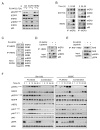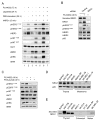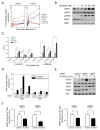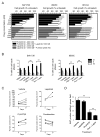Relief of feedback inhibition of HER3 transcription by RAF and MEK inhibitors attenuates their antitumor effects in BRAF-mutant thyroid carcinomas
- PMID: 23365119
- PMCID: PMC3651738
- DOI: 10.1158/2159-8290.CD-12-0531
Relief of feedback inhibition of HER3 transcription by RAF and MEK inhibitors attenuates their antitumor effects in BRAF-mutant thyroid carcinomas
Abstract
The RAF inhibitor vemurafenib (PLX4032) increases survival in patients with BRAF-mutant metastatic melanoma, but has limited efficacy in patients with colorectal cancers. Thyroid cancer cells are also comparatively refractory to RAF inhibitors. In contrast to melanomas, inhibition of mitogen-activated protein kinase (MAPK) signaling by PLX4032 is transient in thyroid and colorectal cancer cells. The rebound in extracellular signal-regulated kinase (ERK) in thyroid cells is accompanied by increased HER3 signaling caused by induction of ERBB3 (HER3) transcription through decreased promoter occupancy by the transcriptional repressors C-terminal binding protein 1 and 2 and by autocrine secretion of neuregulin-1 (NRG1). The HER kinase inhibitor lapatinib prevents MAPK rebound and sensitizes BRAF-mutant thyroid cancer cells to RAF or MAP-ERK kinase inhibitors. This provides a rationale for combining ERK pathway antagonists with inhibitors of feedback-reactivated HER signaling in this disease. The determinants of primary resistance to MAPK inhibitors vary between cancer types, due to preferential upregulation of specific receptor tyrosine kinases, and the abundance of their respective ligands.
Conflict of interest statement
Figures







Comment on
-
Deja Vu: EGF receptors drive resistance to BRAF inhibitors.Cancer Discov. 2013 May;3(5):487-90. doi: 10.1158/2159-8290.CD-13-0131. Cancer Discov. 2013. PMID: 23658295 Free PMC article.
References
-
- Davies H, Bignell GR, Cox C, Stephens P, Edkins S, Clegg S, et al. Mutations of the BRAF gene in human cancer. Nature. 2002;417:949–54. - PubMed
-
- Kimura ET, Nikiforova MN, Zhu Z, Knauf JA, Nikiforov YE, Fagin JA. High prevalence of BRAF mutations in thyroid cancer: genetic evidence for constitutive activation of the RET/PTC-RAS-BRAF signaling pathway in papillary thyroid carcinoma. Cancer Res. 2003;63:1454–7. - PubMed
-
- Xing M. BRAF mutation in papillary thyroid cancer: pathogenic role, molecular bases, and clinical implications. Endocr Rev. 2007;28:742–62. - PubMed
-
- Yang H, Higgins B, Kolinsky K, Packman K, Go Z, Iyer R, et al. RG7204 (PLX4032), a selective BRAFV600E inhibitor, displays potent antitumor activity in preclinical melanoma models. Cancer Res. 2010;70:5518–27. - PubMed
Publication types
MeSH terms
Substances
Grants and funding
LinkOut - more resources
Full Text Sources
Other Literature Sources
Molecular Biology Databases
Research Materials
Miscellaneous

